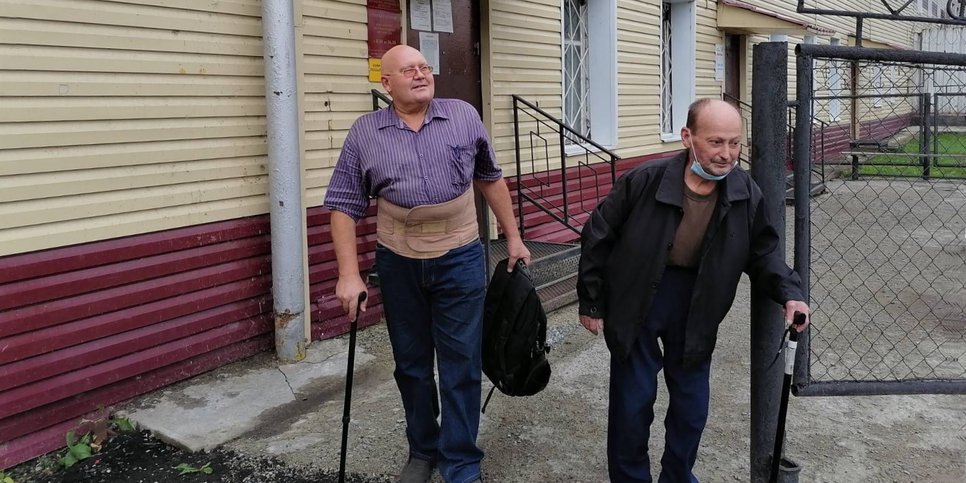In the photo: Believers Anatoliy Isakov and Alexander Lubin, both with disability group II, leave the pre-trial detention center. Kurgan city, August 2021
In the photo: Believers Anatoliy Isakov and Alexander Lubin, both with disability group II, leave the pre-trial detention center. Kurgan city, August 2021
After a Complaint of Jehovah's Witnesses to the ECHR, Two Seriously Ill Residents of Kurgan Were Released From Custody
Kurgan RegionOn August 28, 2021, after a request from the European Court of Human Rights and Human Rights Defenders, as well as a medical examination, the court released Aleksandr Lubin and Anatoliy Isakov from the pre-trial detention center. For about 1.5 months, believers with disabilities were kept in conditions of torture that threaten their lives.
On July 13 and 14, 2021, in Kurgan and Shadrinsk (Kurgan Region), security forces conducted mass searches of Jehovah's Witnesses. Several believers were detained. 56-year-old Anatoliy Isakov and 65-year-old Aleksandr Lubin were taken into custody by a court decision.
Both believers were assigned the II group of disability due to serious illnesses, and the conditions of detention in the pre-trial detention center threatened their lives and were comparable to torture. Anatoliy Isakov was diagnosed with cancer of the blood, multiple compression fractures of the spine, ribs and other diseases. Due to the fact that he was behind bars, his course of chemotherapy was interrupted. Also, the believer was deprived of vital potent medicine, in connection with which Anatoliy experienced unbearable pain. He cannot walk without a wheelchair. Before the criminal prosecution, a believer, on average, needed hospitalization 6 times a year. The situation was aggravated by the fact that Anatoliy Isakov was infected with COVID-19 in the pre-trial detention center.
Aleksandr Lubin has several diagnoses: a serious vascular disease, hypertension, as well as an autoimmune disease that affects various organs. In addition to medical treatment, he needs humidified oxygen for 16 hours every day — during his imprisonment, Aleksandr was deprived of all this. It is difficult for a believer to walk, and in the event of a fall, he is unable to rise without assistance. Aleksandr's wife, Tatyana, also has a disability group II (she suffered 4 strokes). The arrest of her husband endangered her health as well — her legs began to fail, she had problems with speech.
When deciding to choose a measure of restraint for believers, the judges relied on the certificates of the doctors of the Kurgan Regional Clinical Hospital, according to which Lubin and Isakov have no illnesses that prevent them from being held in the pre-trial detention center. The defense sent petitions to the Kurgan City Court with a request to replace it with a preventive measure not related to detention, but the court ignored them. Also, in view of the serious health condition of the believers, the lawyers demanded that the leadership of Detention Centre No.1 send Lubin and Isakov for a medical examination, however, this was ignored. On August 6, the Kurgan Regional Court did not satisfy the believers' appeals and left them in a pre-trial detention center.
Since all internal means of the defense had been exhausted, on August 8, 2021, the lawyers lodged complaints with the European Court of Human Rights, together with an application for interim measures in accordance with Rule 39 of the Rules of Court. According to this rule, the ECHR, prior to its decision, may require the application of any preliminary measures in the interests of the parties, especially when there is an imminent threat of irreparable harm to human life and health. The ECHR communicated the complaint and petition to the Russian Government, demanding that the Russian Federation respond urgently.
As a result, on August 24, the believers were sent for a medical examination to the same Kurgan Regional Clinical Hospital. This time, the doctors discovered that the illnesses of Lubin and Isakov really impede their further detention. In this regard, the investigator applied to the court with a petition to change the preventive measure in the form of detention to prohibit certain actions. The court granted the petition and released the believers, but since the case has not been closed, they still face prison terms.
The decision of the Supreme Court to liquidate legal entities of Jehovah's Witnesses in 2017 gave rise to real persecution of ordinary believers. This legal "collision", as Tatyana Moskalkova, the Commissioner for Human Rights in the Russian Federation, put it, cripples the lives of hundreds of people. The number of criminal cases against Jehovah's Witnesses in Russia is growing rapidly, dozens of believers are behind bars.



